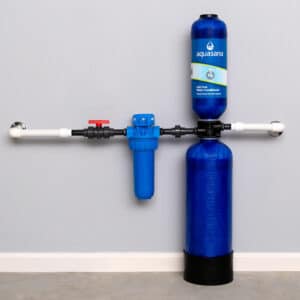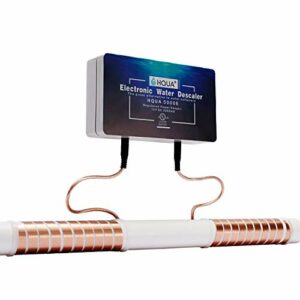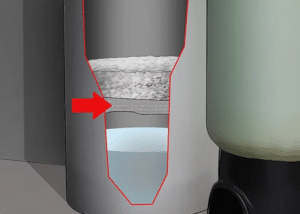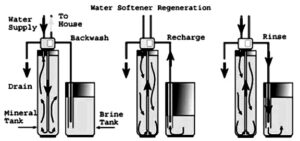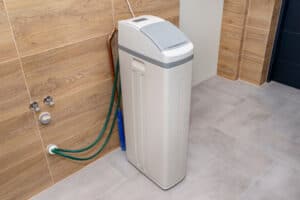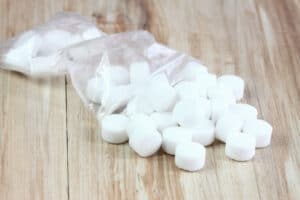With the ever-growing list of water softener alternatives, digging through all of each research and details can become a bit burdensome. When determining which is right for you, you want to be sure to know the processes of each to determine what is best suited for your home and your family.
Here is a list of water softener alternatives broken down into the five leading technologies they use.
What Are the Best Water Softener Alternatives?
1. Reverse Osmosis Systems
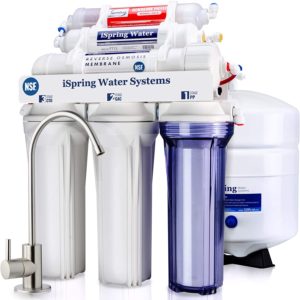
Recent technology for alternative water softeners has come out in the form of reverse osmosis. This system applies pressure to the hard water forcing it to pass through a membrane into softer water. Through this process, you receive pure, soft water.
- Can remove up to 99% of dissolved solids in your water
- Save costs from no longer needing to buy bottled water
- Food made from home using water will taste better
- No energy consumed through this process
- Quick and easy maintenance
- Higher-end costs for water softener alternatives
- If your water is highly chlorotic, you could damage your system
- Time-consuming process to fill your reserve tank
- Costly repairs and maintenance
Overall, reverse osmosis is an excellent salt-free system to consider if you are not afraid of the costs associated with it. Having the purest form of water available to your home and family is something that might not be worth putting a price on.
2. Electrically Induced Precipitation
One water softener alternative to consider uses electrically induced precipitation. This process ultimately precipitates the compounds causing water hardness using a direct electrical current. The precipitation does form on an electrode that will need periodic cleaning.
- Save money over time versus salt system
- Protect from limescale in your home
- Only reduces scale by approximately 50%
- Requires backwash to keep electrode clean and functioning properly
- Higher energy costs due to heating elements
While these electrically induced precipitation systems are available for commercial installation, they are much more difficult to find for residential uses.
3. Electrochemical Water Treatment
Electrochemical water treatment is another salt-free system worth considering when looking into an alternative water softener. Similar to electrically induced precipitation, this system uses electricity to rid your water of its hardness. Rather than using precipitation, though, electrochemical water treatment dissolves the minerals and contaminants in your water.
This is a common system you will find under many different names. You might see this system being referred to as; continuous electrolytic deionization, capacitive deionization, or electrically regenerated ion exchange. Regardless of the name, they all function the same way using electricity to soften your water.
The electrochemical water treatment uses a negatively charged electrode, causing the positively charged ions’ movement towards removing the hardness in your water.
- No chemicals or maintenance required
- Easy to install with no plumbing required
- More cost-effective than traditional water softening systems
- Long lifetime of system
- High upfront cost of the system
- Not a lot of research backing up this system
While the electrochemical water treatment might have a larger price tag on upfront costs, you will undoubtedly see cost savings over the lifespan of having this system in your home. As you will find in doing your research with these water softener alternatives, some technologies lack research. Be sure to conduct your research and make decisions on what makes the most sense for your home.
4. Template-Assisted Crystallization
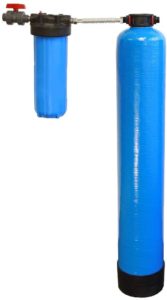
Another alternative water softener system uses a template-assisted crystallization. This process does not remove your water’s hardness but will convert the ions into microscopic scale-resistant crystals using surface-treated resin beads.
Through this process, crystals are formed and released from the beads. These crystals are entirely insoluble and will not form surface scale.
- Do not require electricity
- No regular cleaning necessary
- No additional chemicals needed
- Environmentally friendly option
- Magnesium and calcium not entirely removed from the water
- Long life expectancy of tanks
- Not a lot of testing done to see effectiveness over the long run
- Recommend the use of carbon and iron filters to extend the longevity
If your family prioritizes environmentally friendly options when furnishing your home, this is a great system to consider. Additionally, with low costs associated, this is a leading water softener alternative.
5. Magnetic Water Treatment
The last water softener alternative you will find is magnetic water treatment. This system uses magnets and electromagnetic devices to treat your water and is known to be controversial due to the lack of scientific backing on its effectiveness.
- No dangerous chemicals added to your water
- No extra systems needed
- Calcium stays in the water
- Zero waste; environmentally friendly
- Quiet working system
- Other electrical systems nearby can impact its effectiveness
- Your water has to stay in contact with the magnetic area to remain treated
- Lack of studies and data proving the effectiveness of these systems
- Systems use electricity with costs associated
- Relatively expensive
The hard water will pass through a magnetic field through magnetic water treatment, forming microscopic precipitation that does not collect on your plumbing fixtures. Again, do not forget that there has not been much research backing this water softener alternative, and for that reason, this option does not come recommended.
How Does a Water Softener Work?
All water softeners use an ion exchange of some sort to remove the components that are creating hard water in your home. These components are typically calcium and magnesium ions. The softeners replace the calcium and magnesium with sodium or potassium ions, which, in turn, results in softer water for you.
This process often relies on a salt-based system that requires frequent maintenance and replenishment to keep it functioning at optimal levels. As you can imagine, this cost can add up over a year, let alone a lifetime in your home.
Suppose you add up the cost of salt and maintenance. In that case, a water softening system could cost a family of four $686 per year more than water softener alternatives available through salt-free technology.
Related: How To Tell If Your Water Softener Is Working
Why Should You Use a Water Softener Alternative?
Recently, there have been many advances in technology, allowing for alternatives to traditional water softeners. If you are looking to soften up their water without breaking the bank, this is excellent news for you. For the environmentally friendly, this provides options that limit wastewater production going back into the environment somewhere.
If you are currently using a traditional salt-based water softening system, here are a few reasons you might want to reconsider:
- Wastewater creation; not environmentally friendly
- Municipalities are beginning to ban these systems in the US due to droughts
- Burdensome to purchase/replenish 40lb bags of salt routinely
- Added sodium in your diet through water consumption
Through the use of different technologies, water softener alternatives can provide you with the benefits of salt systems without dealing with the pretty hefty list of downsides. What is even better is that there are so many different options available to you to choose from.
So, if ridding your home of hard water is a high priority, but you’re looking to cut some costs, it’s time to look into an alternative to water softeners.
Related: Water Softener Benefits & Why You Need One
Are Water Softener Alternatives Right for You?
When determining whether or not finding an alternative to water softeners is right for your home, it is essential to remember that these newer salt-free technologies require energy to use. But, not to worry, because there have been many studies that show the amount of electricity used is typically lower than the rates of household appliances.
Your costs of maintaining a salt-free water softener alternative will remain lower than that of a traditional system in the long run. Any homeowner can agree that any cost savings is a huge benefit.
With these cost savings do come one downside, though, which is that unlike traditional systems, these alternative water softener systems do not entirely remove the calcium and magnesium in your water. They will certainly reduce the problems you might find due to hard water, but the technology cannot entirely remove it.
Ultimately, you will decide on the water treatment in your home, but be sure to keep these crucial factors in mind. Finding the right water softener alternative system is unique to you and your family and household’s needs. Luckily, you have many options to choose from.

